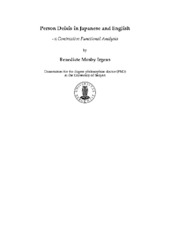| dc.description.abstract | This dissertation is a contrastive analysis of person deixis in English and Japanese. Person deixis is the linguistic reference to discourse participant roles, i.e. expressions referring to the speaker, listener and to other persons, who may or may not be present in the discourse situation. Person deixis may be manifested linguistically in various ways across languages. In English, it is grammaticalized through the pronominal system and verbal agreement inflection. In Japanese, in contrast, person deixis is primarily lexically manifested in the form of “person nouns”, whose meanings vary according to different social variables. More importantly, Japanese allows for widespread nominal ellipsis, so that such person nouns are frequently left unexpressed in real discourse. These features lead to the hypothesis that person deixis is less grammaticalized in Japanese than in English. The study has a functional linguistic orientation, and uses Andrew Chesterman´s methodology from 1998, which allows for a hypothesisdriven, step-by-step contrastive analysis of a designated linguistic domain. The theoretical part of the dissertation includes discussions on the definition of pronouns and of deictic studies as belonging simultaneously to the fields of semantics and pragmatics. By using a combination of intuitive data and two corpora of translated texts, I search for grammatical devices in Japanese that compensate for the low degree of grammaticalization of person deixis. The devices that are explored in Japanese are honorifics, benefactives, and the interaction between psych predicates and evidentials. Through a careful analysis of these forms, I argue that they all manifest a different, understudied type of deixis: empathetic deixis. The defining feature of empathetic deixis is not first, second and third person, but rather psychologically proximal versus distal: persons with whom the speaker identifies more or less closely. This finding has led to a revised typological hypothesis that Japanese is an empathy-prominent language, while English is a personprominent language. | en_US |
